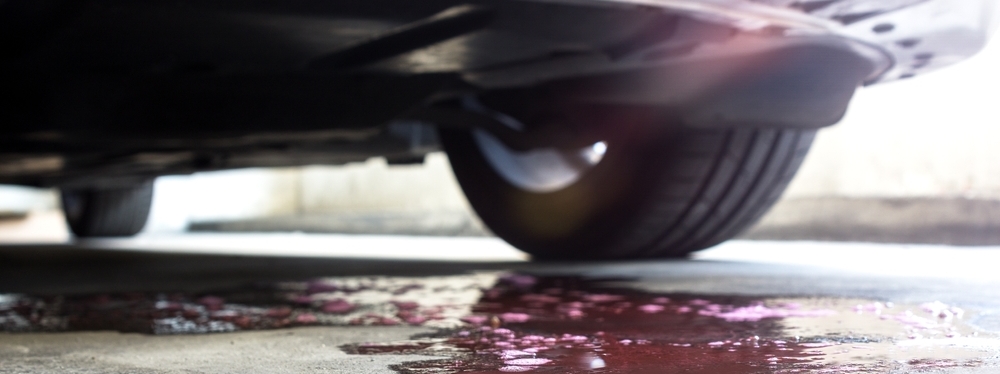
28 Jul Why Is My Car Leaking Coolant?
 Now that summer is in full swing, we are not the only ones dreading the heat. Driving in high temperatures can be hard on our cars, too. So definitely take note if the temperature gauge on your dashboard is inching up into the danger zone. Your vehicle’s cooling system regulates the engine’s temperature by pumping antifreeze through the radiator, but leaking coolant can ruin your entire day.
Now that summer is in full swing, we are not the only ones dreading the heat. Driving in high temperatures can be hard on our cars, too. So definitely take note if the temperature gauge on your dashboard is inching up into the danger zone. Your vehicle’s cooling system regulates the engine’s temperature by pumping antifreeze through the radiator, but leaking coolant can ruin your entire day.
When Cooling System Parts Go Bad
The cooling system plays a key role in ensuring your vehicle’s engine stays at the optimal temperature. Malfunctions and leaks within this system can lead to crucial mechanical and performance problems. Your car’s combustion engine generates lots of heat while running. The cooling system circulates coolant, which helps dissipate that excess heat. Let’s look at some of the most common issues that affect the cooling system.
Bad Radiator Hose
Radiator hoses transport coolant through the cooling system. They are often made from a rubber compound (ethylene propylene or EPDM) and molded into specific shapes to fit into tight spaces in the engine compartment. While they are resistant to heat and hot fluids, they can crack and leak after years of use. A bad radiator hose can quickly drain your antifreeze reservoir, so replace it as soon as possible to prevent engine damage.
Blown Head Gasket
The head gasket prevents the engine oil and coolant from mixing inside the engine block. With a blown head gasket, the engine’s temperature will rise, and the coolant level in the reservoir will decrease.
Cracked Coolant Reservoir
Most modern cars have a small, transparent plastic tank for coolant. In most cases, you can easily see the fluid level; it should be above the minimum but below the maximum fill lines. The coolant tank stores the excess coolant from the radiator. As your engine heats up, the coolant expands into the reservoir. When the engine cools down, the coolant flows back into the radiator. You should occasionally inspect the coolant reservoir for cracks and ensure there are no leaks.
Damaged Radiator Cap
The radiator keeps the pressurized antifreeze solution inside your vehicle’s cooling system. Leaking coolant can sometimes occur due to a dirty or damaged seal on the cap. A radiator cap is a simple and inexpensive part to replace. Just be sure only to remove the radiator cap when your engine is cool to avoid serious injury from boiling liquid.
Leaking Thermostat Seal or Housing
Leaking coolant often occurs around the thermostat housing due to an old or cracked seal. Depending on the type of vehicle you own, the thermostat housing encases the thermostat in either a separate or integrated design.
Loose Radiator Clamps
Radiator clamps hold radiator hoses in place. These clamps come in various designs, like spring clamps, wire clamps, or screw and band clamps. A loose radiator clamp allows coolant to leak from the radiator hose connection. Sometimes, simply tightening the clamp will resolve the leak. Damaged clamps require replacement.
Malfunctioning Water Pump
Your car’s water pump circulates coolant from the radiator to the engine block in a continuous cycle. The engine usually powers the water pump via a drive belt. Since the water pump runs constantly while the engine is running, it is prone to wear and tear. As the water pump ages, it can malfunction by varying the amount of coolant circulating through the system. Insufficient coolant levels will cause the engine to overheat. You may hear a whirring or groaning noise from the water pump before it fails.
Punctured Radiator
Your vehicle’s radiator handles extreme temperatures, chemicals, and pressurized fluids. They are usually mounted right behind the front grill of your car to take advantage of the airflow. Unfortunately, under these conditions, corrosion and damage from road debris are common. If you see leaking coolant from the radiator, there’s a good chance that a hole or crack is causing the problem.
Signs Your Cooling System Needs Service
Recognizing signs that your cooling system needs service can reduce the risk of engine damage due to overheating. Below are a few symptoms that your vehicle requires auto maintenance or repairs.
Antifreeze Level Is Low
If you are frequently refilling the coolant reservoir with antifreeze and distilled water, there’s likely a leak somewhere in the cooling system.
Leaking Coolant
Performing a visual inspection can reveal coolant leaks. Look for damp, sweet-smelling spots in the cooling system. Bright, neon-colored stains (yellow-green, green, orange, or pink) are commonly associated with antifreeze. Check the following components:
- Coolant Reservoir
- Heater core
- Hoses & clamps
- Radiator
- Radiator Cap
- Thermostat
- Under Your Car
- Water pump
Since antifreeze is toxic, please clean up leaks immediately to prevent accidental poisoning.
Overheating Engine
If your engine is operating hotter than normal, it could be due to a cooling system issue. An overheating engine occurs when your vehicle lacks sufficient coolant levels or has old, contaminated antifreeze. To prevent severe engine damage, schedule a diagnostic service to determine the cause of your engine overheating.
Steam or White Smoke
Seeing steam or white smoke billowing out from under your hood indicates that your cooling system needs immediate service. Steam occurs only when coolant reaches the boiling point, because the cooling system is not dissipating enough heat. If you experience a smoking engine, immediately schedule a cooling system repair to protect your engine from heat damage.
Temperature Gauge Is In The Red
If the temperature gauge on your vehicle’s dashboard reads hotter than normal, your cooling system isn’t regulating the engine’s temperature sufficiently. This condition may be caused by leaking coolant, a stuck thermostat, or a punctured radiator.
Cooling System Service in Ann Arbor, MI
Coolant leaks are more than a common inconvenience; they are a warning sign that your vehicle’s cooling system may be failing. Come to Ron’s Garage in Ann Arbor, MI, if you’ve noticed leaking coolant from your radiator or low antifreeze levels. Our experienced service technicians will perform a diagnostic inspection of your vehicle’s cooling system. Once we identify the issue, we will provide repair options tailored to your needs and budget.
Make A Leaking Coolant Appointment
Call us today at (734) 961-4701 or visit our website to make an appointment. We are open Monday – Thursday: 7:00 AM – 6:00 PM. We look forward to seeing you!
Specials and Coupons
Check out our monthly specials and coupons to save big on auto services at Ron’s Garage!

